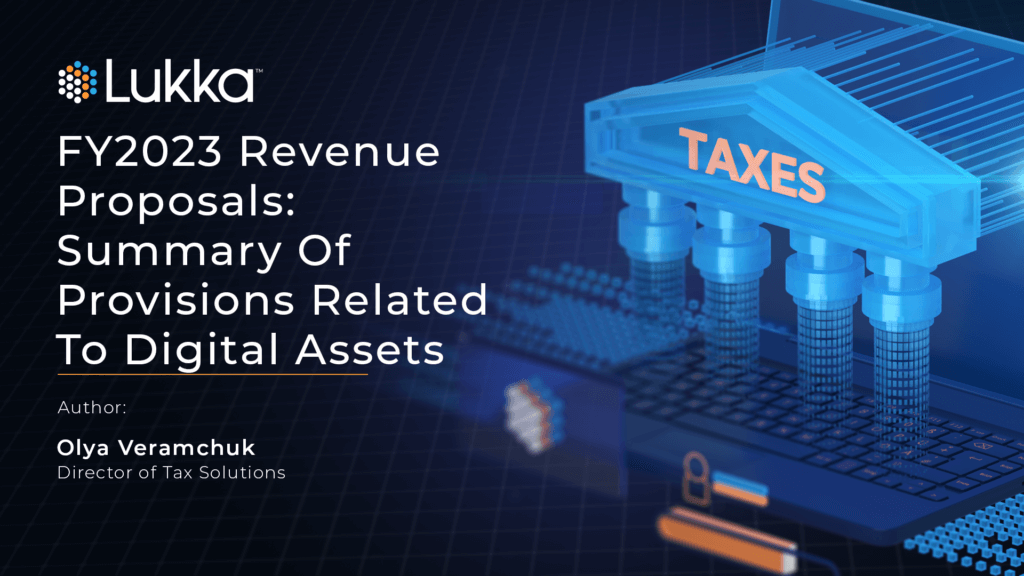Author: Olya Veramchuk
On March 28, the Biden administration released the Fiscal Year 2023 Budget proposal together with the “Greenbook” from the US Treasury Department, which outlines a number of revenue proposals recommended to Congress. The four provisions related to digital assets are discussed below.
Expansion of mark-to-market rules to include digital assets
Under the current tax law, dealers in securities are required to apply the mark-to-market method to the securities held at year-end and recognize the resulting gain or loss. A mark-to-market election is available to dealers in commodities and traders in securities or commodities. This provision proposes adding digital assets as a separate category of assets, beyond commodities and securities, and availing the mark-to-market election to the dealers and traders in such assets. The rules would also cover the derivatives on the actively traded digital assets, similar to the existing rules for commodities and securities. It is worth noting that digital assets would not be treated as securities or commodities but instead will remain in that third separate category of assets.
The expansion of mark-to-market rules has the most impact on revenue of all the Greenbook proposals and is estimated to generate approximately $4.8b in the first year of the rule changes. Some have raised concerns about the projected revenue, considering that Bitcoin and Ethereum are already treated as commodities eligible for the mark-to-market election under the existing law. Further, a high volume of trades, a short holding period, and the frequency of the portfolio turn-around are some of the main conditions of qualifying for a trader treatment for tax purposes. Thus, it’s not very likely that any meaningful built-in gains would be accumulated in trader portfolios.
The proposal would be effective for taxable years beginning after December 31, 2022.
Expansion of tax-free securities lending rules to include digital assets
Under the current US tax law, securities lending does not give rise to adverse tax implications, provided it is done pursuant to an agreement that satisfies certain requirements. The same is true for returning the loaned securities. The term “securities” includes traditional financial instruments, such as corporate stock, notes, bonds, and other similar instruments, but does not have any references to digital or crypto assets. Given the recent growth of the digital asset lending market, the Greenbook proposes amending the existing securities loan nonrecognition rules to include actively traded digital assets, provided the lending is done under terms similar to those currently required for lending securities.
This provision is estimated to have a negligible impact on the revenue. The proposal could be interpreted as an affirmation of the nonrecognition tax treatment many US taxpayers have already been applying to digital assets lending transactions.
The proposal would be effective for taxable years beginning after December 31, 2022.
Amendment of the information reporting rules to include digital assets
The existing information reporting rules stipulate a number of instances where certain information reporting, and often withholding, is required when foreign taxpayers are receiving US-sourced income or where there is US ownership of foreign accounts. The proposed changes expand the current reporting requirements for digital asset brokers and financial institutions. Brokers would be required to report gross proceeds and other information with respect to sales of digital assets by both US and non-US customers. Further, information concerning substantial foreign owners of certain passive entities would also have to be reported. The additional reporting would allow the US to share the information on an automatic basis with other jurisdictions pursuant to an international automatic exchange of information framework. In exchange, the US would reciprocally receive information on US taxpayers who, directly or through passive entities, engage in digital asset transactions outside the US.
This provision is estimated to generate about 10% of the total digital asset revenue in the first year after enactment.
The proposal would be effective for returns required to be filed after December 31, 2023.
Amendment of foreign asset account reporting rules to include digital assets
The existing rules require any individual that holds an interest in one or more specified foreign financial assets with an aggregate value of at least $50,000 during a taxable year to disclose such ownership on their tax return. Currently, the term “specified assets” includes financial accounts maintained by a foreign financial institution and certain specified foreign assets not held in a financial account. Failure to provide such information without reasonable cause is subject to significant penalties. Under the proposal, a third category of assets – i.e., any account that holds digital assets maintained by a foreign digital asset exchange or other foreign digital asset service provider (a “foreign digital asset account”) – would be made subject to the reporting rules. Under the proposal, a foreign digital asset account would be defined based on where the exchange or service provider is organized or established, and effort would be made to coordinate this reporting requirement with others to minimize duplication. Further, reporting would only be required for taxpayers who hold an aggregate value that exceeds $50,000 for all three categories of assets.
This proposal is estimated to generate about 10% of the total digital asset revenue in the first year after enactment, similar to the other information reporting provision.
If adopted by Congress and signed into law by the President, the proposal would apply to returns filed after December 31, 2022.




